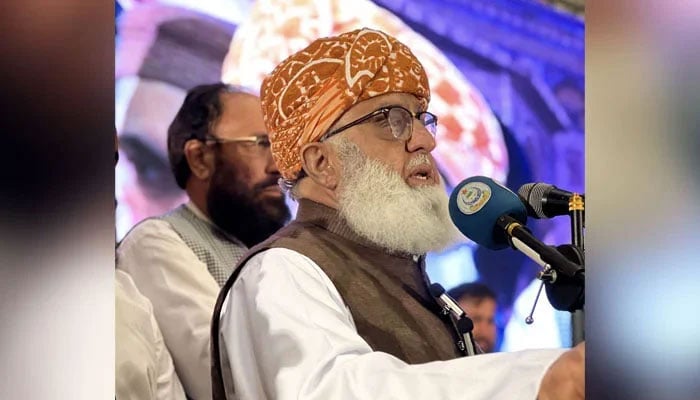‘Fake polls, govts’ unacceptable: Fazl
He announced that the next gathering would be arranged on June 1 in Muzaffargarh, Punjab
PESHAWAR: Jamiat Ulema-e-Islam-Fazl (JUIF) chief Maulana Fazlur Rehman said Thursday his followers would would continue struggle against what he termed “the fake February 8 elections” and “fake governments.”
“We reject the results of February 8 polls. Our arguments carry substantial evidence. We would not remain silent due to threats and intimidation. We don’t accept the assemblies, Balochistan, Sindh, Punjab and Khyber Pakhtunkhwa, remain silent due to threats and intimidation. We don’t accept the assemblies, Balochistan, Sindh, Punjab and Khyber Pakhtunkhwa, which were formed as a result of rigged election,” he said, while addressing a public gathering against the alleged rigging in the February 8 general elections. A large number of people attended the gathering that was arranged on Dilzak Road here.
“These assemblies are not the representatives of people. They are representatives of establishment. The nation considers them an insult and we will never accept insult of the nation,” Fazl said.
He also spoke against the merger of tribal areas with Khyber Pakhtunkhwa. The JUIF chief said that he was punished for his support to the Palestinian cause. “When I raised my voice as Muslim leader in support of Palestine and visited Qatar to meet the Palestinian leadership, we were kept out of parliament for it,” he claimed.
He announced that the next gathering would be arranged on June 1 in Muzaffargarh, Punjab.
Other speakers said that Imran was not a representative of the nation and national institutions, he was an agent of the international establishment.
-
 Kelly Osbourne's Mom Sharon Receives 'shut Up' Call Accepting An Award For Late Hubby?
Kelly Osbourne's Mom Sharon Receives 'shut Up' Call Accepting An Award For Late Hubby? -
 Claude Overtakes ChatGPT On Apple App Store After Pentagon Dispute
Claude Overtakes ChatGPT On Apple App Store After Pentagon Dispute -
 What Happened To Ayatollah Ali Khamenei's Family During US -Israel Attack On Iran
What Happened To Ayatollah Ali Khamenei's Family During US -Israel Attack On Iran -
 BRIT Awards 2026 Winners Revealed
BRIT Awards 2026 Winners Revealed -
 Shia LaBeouf Arrested Again In New Orleans On Additional Battery Charge
Shia LaBeouf Arrested Again In New Orleans On Additional Battery Charge -
 Shamed Andrew Upset With THIS Family Member Over Current Condition
Shamed Andrew Upset With THIS Family Member Over Current Condition -
 Michael Jackson Estate Sued With Allegations Of Years Of Abuse From Late Singer
Michael Jackson Estate Sued With Allegations Of Years Of Abuse From Late Singer -
 Meghan Markle Shows ‘real Pain’ With Her Body Language In Jordan
Meghan Markle Shows ‘real Pain’ With Her Body Language In Jordan -
 Jennifer Garner Names Her Movie That She Hasn't Seen In Full Since Its Premiere
Jennifer Garner Names Her Movie That She Hasn't Seen In Full Since Its Premiere -
 Bridgerton’s Michelle Mao On Facing Backlash As Season Four Antagonist
Bridgerton’s Michelle Mao On Facing Backlash As Season Four Antagonist -
 King Charles Gets New ‘secret Weapon’ After Andrew Messes Up
King Charles Gets New ‘secret Weapon’ After Andrew Messes Up -
 Shia LaBeouf Makes Bold Claim About Homosexuals In First Interview After Mardi Gras Arrest
Shia LaBeouf Makes Bold Claim About Homosexuals In First Interview After Mardi Gras Arrest -
 Princess Beatrice, Eugenie ‘strained’ As They Are ‘not Turning Back’ On Andrew
Princess Beatrice, Eugenie ‘strained’ As They Are ‘not Turning Back’ On Andrew -
 Benny Blanco Addresses ‘dirty Feet’ Backlash After Podcast Moment Sparks Online Frenzy
Benny Blanco Addresses ‘dirty Feet’ Backlash After Podcast Moment Sparks Online Frenzy -
 Sarah Ferguson Unusual Trait That Confused Royal Expert
Sarah Ferguson Unusual Trait That Confused Royal Expert -
 Prince William, Kate Middleton Left Sarah Ferguson Feeling 'worthless'
Prince William, Kate Middleton Left Sarah Ferguson Feeling 'worthless'




